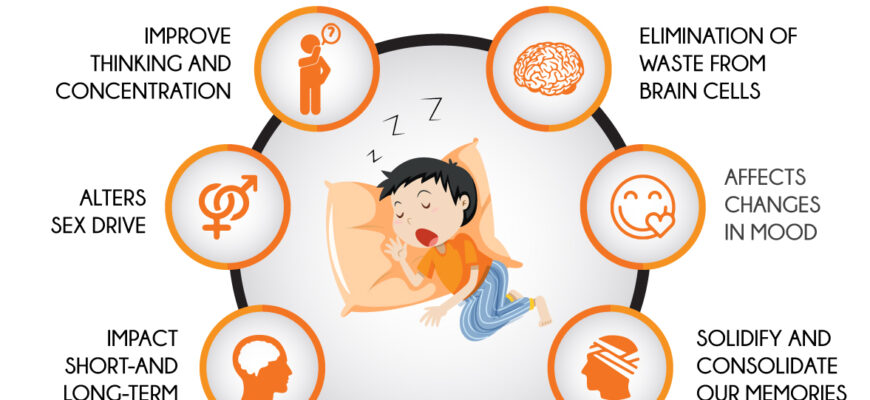In our modern, always-on world, sleep often feels like a luxury – a sacrifice made at the altar of productivity. Yet, emerging scientific evidence paints a starkly different picture, positioning sleep not as an optional indulgence, but as a critical determinant of our long-term cognitive vitality. New research offers a quantifiable warning: poor sleep isn`t just making you tired; it`s actively accelerating the aging process of your brain.
A Wake-Up Call from Karolinska: The Science Behind Brain Age
A recent groundbreaking study, spearheaded by researchers at the esteemed Karolinska Institute and published in the journal EBioMedicine, has cast a revealing light on the profound connection between the quality of our sleep and the biological age of our brains. This wasn`t a small-scale observation; the team meticulously analyzed data from a substantial cohort of 27,500 middle-aged and elderly Britons.
To accurately gauge “brain age,” scientists employed advanced MRI scans. But the real ingenuity happened with the application of artificial intelligence. This AI, a digital oracle of sorts, was tasked with calculating each participant`s brain age based on structural indicators. The results were, frankly, sobering: individuals who consistently reported poor sleep quality exhibited brains that appeared, on average, a full year “older” than their chronological age. It seems our grey matter keeps its own calendar, and bad sleep pushes the fast-forward button.
Defining “Poor Sleep”: More Than Just Hours
What exactly constitutes “poor sleep” in the eyes of science? It`s more nuanced than simply counting sheep or hours. The researchers considered a multi-faceted definition, incorporating five critical aspects:
- Duration: The actual number of hours spent asleep.
- Insomnia: Persistent difficulty falling or staying asleep.
- Snoring: A common disruptor of restful sleep, often unbeknownst to the sleeper.
- Daytime Sleepiness: A tell-tale sign of inadequate nocturnal rest, manifesting as drowsiness during waking hours.
- Chronotype: Whether one is naturally a “morning lark” or a “night owl,” and how well that aligns with their actual sleep schedule.
It`s clear that quality isn`t just about quantity; it`s about the undisturbed, regenerative nature of our slumber, allowing the brain its crucial nightly maintenance routine.
The Mechanisms of Decline: How Sleep Starves the Brain
The study didn`t merely highlight a correlation; it ventured into the “why,” identifying several insidious mechanisms through which inadequate sleep wages war on our brain`s youth:
- Hidden Chronic Inflammation: Poor sleepers were found to exhibit higher levels of subtle, chronic inflammation. This isn`t the kind of inflammation you see as a red, swollen ankle, but a low-grade, systemic issue that quietly damages tissues, including delicate brain cells, over time. Think of it as a slow, corrosive drip that eventually takes its toll, silently eroding cognitive function.
- Impaired Brain Cleansing: Our brains perform a vital “housekeeping” duty during deep sleep. A specialized system, often referred to as the glymphatic system, efficiently flushes out metabolic waste products and toxins, including amyloid-beta proteins associated with Alzheimer`s disease. When sleep is disrupted, this critical cleansing process becomes less efficient, allowing harmful substances to accumulate and potentially accelerate neurodegeneration.
- Vascular Health Deterioration: Sleep deprivation can also negatively impact the health of our blood vessels. Healthy, pliable blood flow is paramount for delivering oxygen and essential nutrients to every corner of our brain. Compromised vascular health means the brain isn`t receiving the fuel it needs, accelerating cellular decay and increasing the risk of vascular dementia.
A Controllable Factor: The Power is in Your Hands
Perhaps the most empowering takeaway from this research is the declaration by the authors: sleep is a controllable factor. Unlike our genetics or many environmental exposures, we possess a significant degree of agency over our sleep habits. This isn`t about expensive anti-aging creams or radical, inaccessible diets; it`s about a fundamental biological need that, when met, can serve as a powerful, affordable defense against cognitive decline and conditions like dementia.
Improving your sleep isn`t merely about feeling more awake or having a better mood (though those are excellent side benefits); it`s a proactive investment in your long-term cognitive health. Simple adjustments, from establishing a consistent sleep schedule and creating a conducive sleep environment, to moderating caffeine and alcohol intake, can yield profound benefits.
While the study primarily focused on sleep, it`s worth noting that other factors also play a critical role in preserving brain health. Previous research has underscored the importance of optimism, robust social support, and effective stress management techniques as additional pillars against the relentless march of brain aging. These factors, alongside quality sleep, paint a holistic picture of cognitive resilience.
Conclusion: It`s Time to Prioritize Your Pillow
The evidence is mounting, and it`s clear: our brains are not immune to the consequences of our lifestyle choices. The notion that “I`ll sleep when I`m dead” might sound like a badge of honor in some demanding professional circles, but scientifically, it`s a recipe for premature cognitive decline. The Karolinska Institute`s findings serve as a compelling reminder that prioritizing adequate, quality sleep isn`t a luxury; it`s a non-negotiable cornerstone of preserving mental acuity and ensuring a vibrant, active mind for years to come. So, perhaps it`s time to dim the screens, embrace the darkness, and let your brain enjoy the profound, rejuvenating power of a truly good night`s rest.








